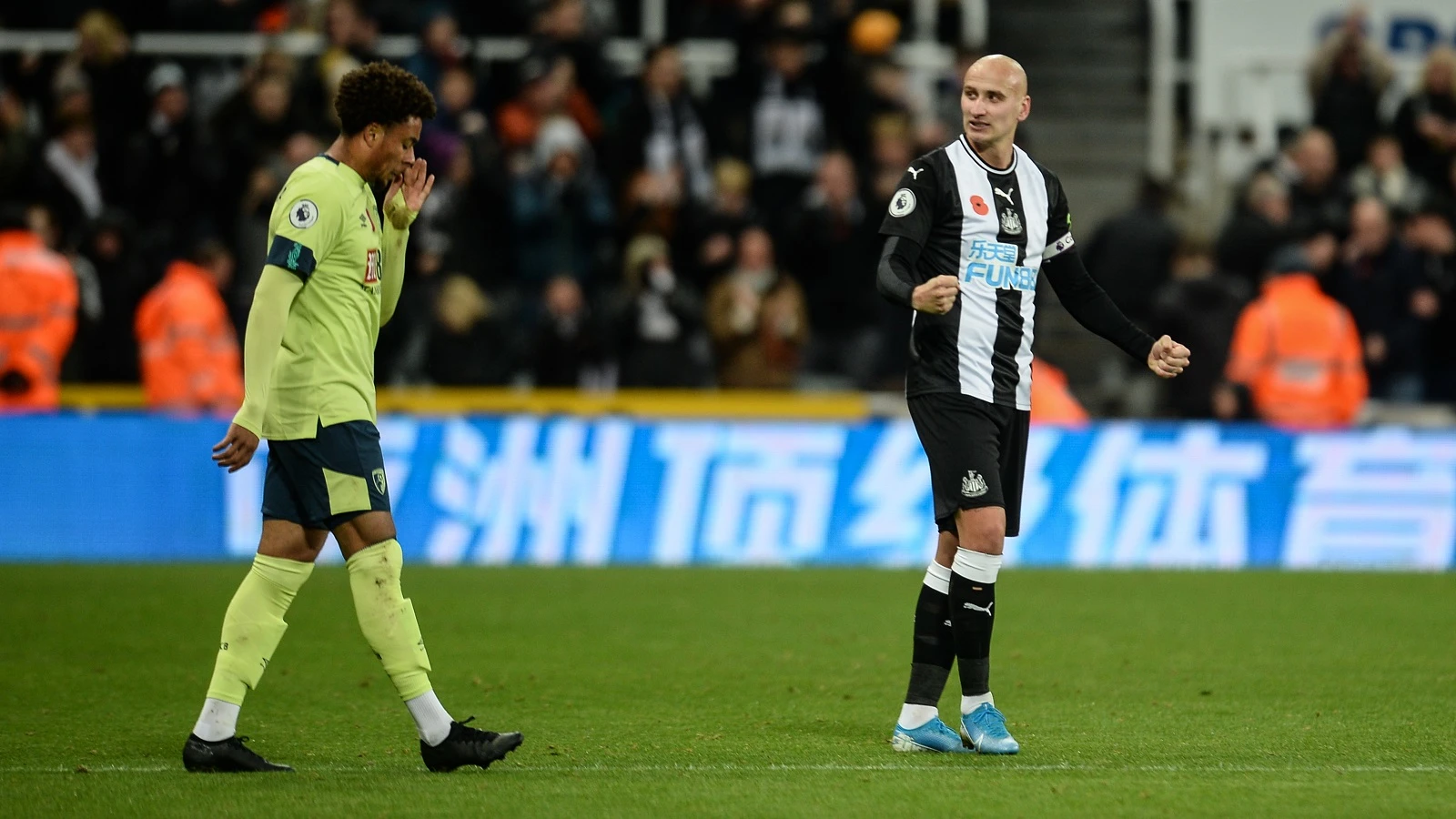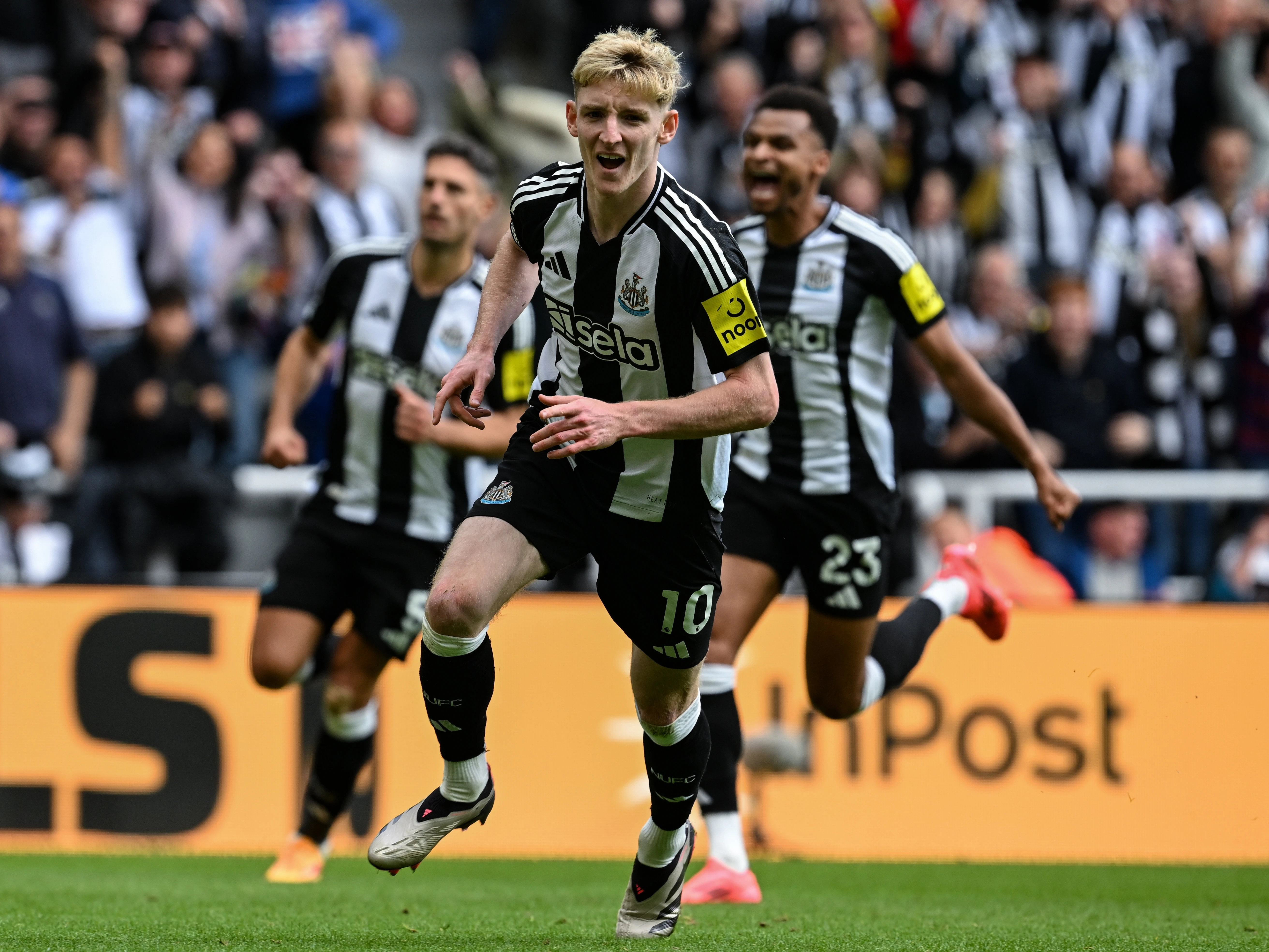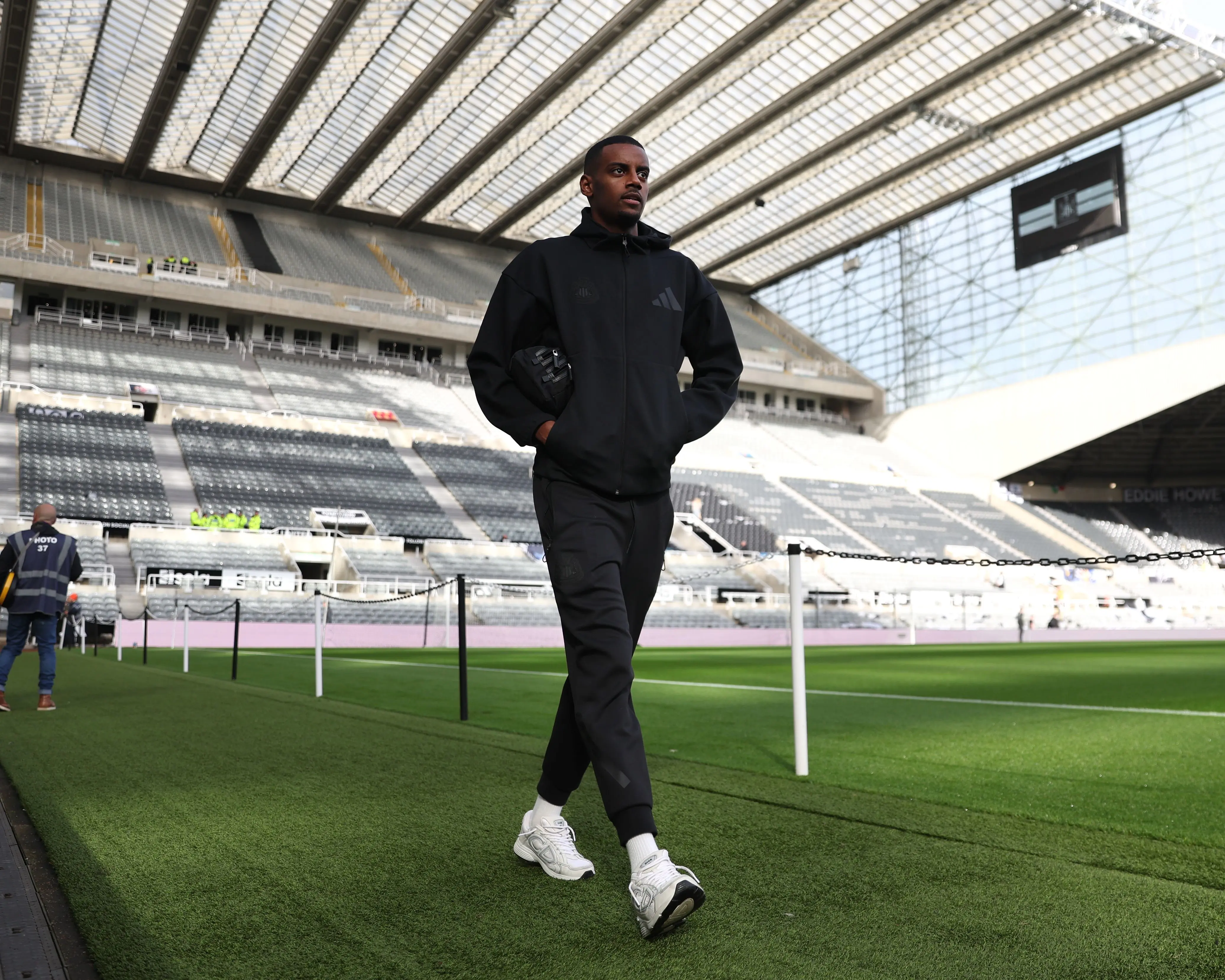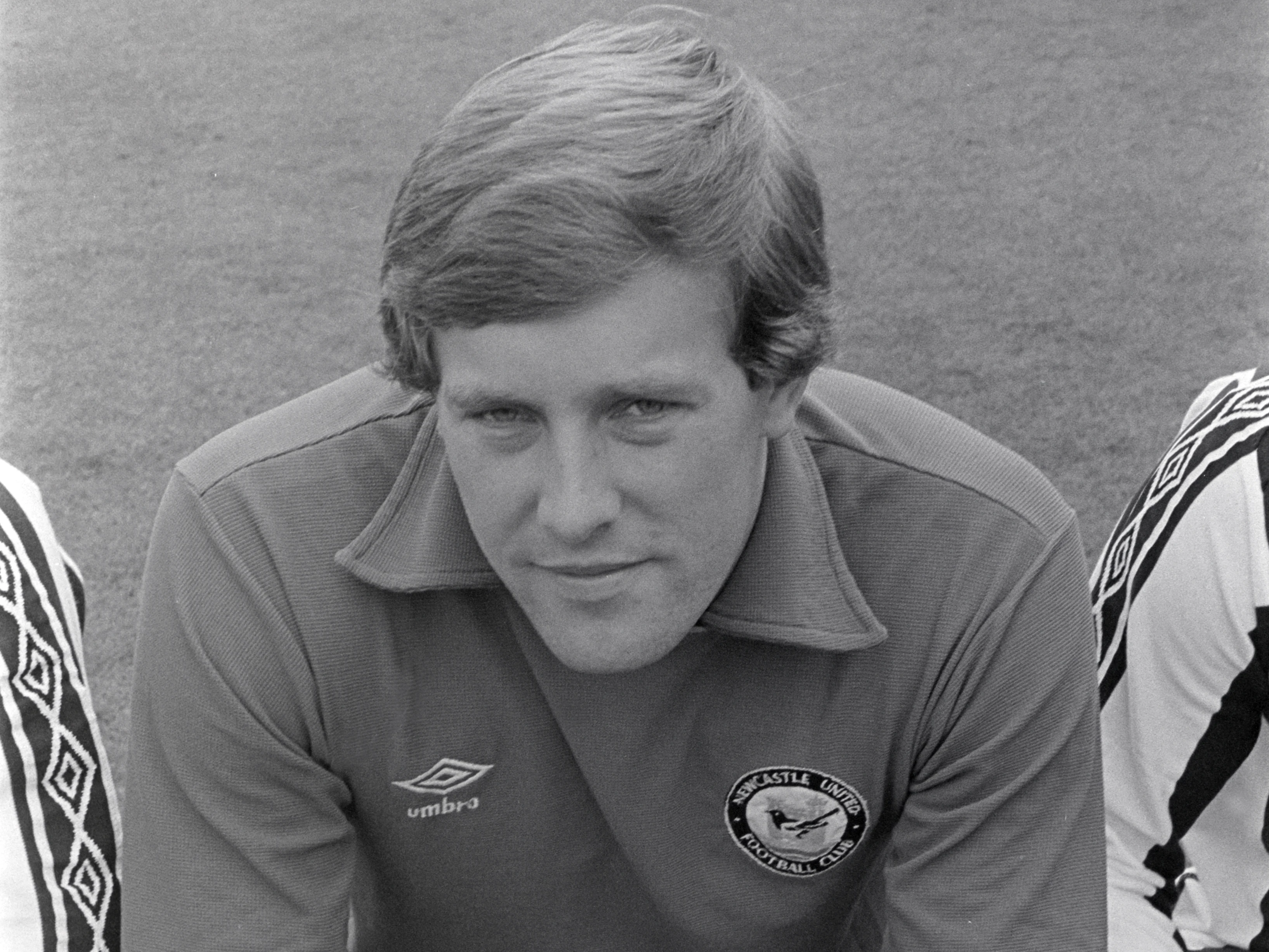A moment amid the frenetic final exchanges of Newcastle United’s home win over Bournemouth caught the eye. With 96 minutes played, the visitors are scrapping, pushing for a leveller, and Josh King has just missed a sitter. Whistles fill the air inside St. James’ Park and referee Martin Atkinson has glanced down at his watch. Nathan Aké hurls the ball down the line and Arnaut Danjuma – standing on halfway – flicks it on, but DeAndre Yedlin nods it straight back. Jonjo Shelvey is standing ten yards in from the touchline, just inside the Magpies’ half. He volleys the loose ball back over his head just as the whistle finally blows, and his arms fly up into the air. He is shouting, like thousands in the stands, and his fists are pumping. There is rapture and relief, and noise. It all came out at the end.
He knows the squad will be “bouncing around the gaff” when they report for training in the week, just like after the win over Manchester United in October, and everything will feel just right for a while. It seems like the target of this show of emotion is the Bournemouth bench but Shelvey, who you wouldn’t consider prone to such animated gestures on the pitch, insists that wasn’t the case. “I just wanted to win the match so badly,” he explains. “While I’m in the team, if you’re winning games, you’re not coming out the team. I can’t have the hump if the team go and win and I’m not playing. I can’t expect to be in the team next week – if I was a manager, I wouldn’t change the team. I know the score in football, I know the script.
“I haven’t got anything towards the Bournemouth staff or anything like that. I just wanted to win the game, to be honest with you. I was just chucking my hands up in pure delight. And it makes your night enjoyable, do you know what I mean? You can go home with a smile on your face, have a Chinese and a beer and things like that. It makes life enjoyable.”
That snapshot shines a light on the juxtaposition of Shelvey, who has long been an enigmatic presence in the minds of football supporters. A couple of months before those fist pumps greeted back-to-back Premier League wins, he had been accused of not being bothered, of being lazy, after a Carabao Cup defeat to Leicester City. He captained United that day and saw a penalty saved in the shoot-out.
Perhaps, he feels, the way he carries himself leads people to that conclusion. “I’m quite a laid-back character, and on the pitch I’m quite casual with the ball because I’ve got confidence in my ability,” he says. “I think it’s just my body language. You try and work on it, but you are what you are at the end of the day. If people don’t like it, that’s their problem. As long as the gaffer knows – he looks at the stats and sees that I’m running and putting it in – then that’s all that matters to me. I don’t really listen to what other people are saying outside.
“I feel in a good place, to be honest. I’m fit, and in terms of ability on the ball I know that I’m up there in the squad – I can make things happen, I can make chances for the strikers, I can set people away. But obviously people are looking at the other side of the game with me.”
As a child he would fight with his brother, George, or challenge him to sprints or games of table tennis, and he remembers the feeling of losing would linger even then. He seems resigned to the debate about his effort continuing around him. “Yeah, people say that I don’t care, or that you’re here just to pick your money up and stuff like that,” he adds, before making a nod to that Bournemouth game. “But I think if they watch clips like that, they’ll soon realise.”
In what has been a season of striking contrasts for Newcastle so far, Shelvey has begun to play with the kind of authority that many expect from him. Last year was a “write-off”, beset by a thigh problem and the emergence of Sean Longstaff and Isaac Hayden’s midfield partnership. This term he feels he is doing better, playing and contributing, and untainted by the humbling at the King Power Stadium, which he missed with a hamstring injury.
It hasn’t all been straightforward. He felt his thigh again at Norwich in August and was dispatched to a surgeon. “It was so bad. It was just so painful.” Shockwave treatment – one in the morning, one straight after training – was suggested as a last resort. Shelvey has one treatment in the morning and another straight after training. He rolls up his shorts. “I’ve still got the lumps in my leg but while it’s still fine, I’m going to keep training and keep playing. I think it’s used to treat kidney stones or something like that. It’s like a gun that goes onto your leg. It’s painful when it’s being done. You have to just grin and bear it, I suppose.”
Shelvey has a couple of goals to show from his start to this campaign, after “grafting his nuts off” through the summer, but there remains some frustration that his best spells in black and white have preceded leaner stretches. It has been a pattern of sorts since he joined Newcastle almost four years ago; there have been periods – like the first half of 2018 – where he has looked at his most influential best, buoyed by the rhythm of constant starts, but it hasn’t always stayed that way.
“The season before (last), everyone in the whole country was saying, ‘you should be going to the World Cup’, and now you get labelled as a bad footballer,” he says. “That don’t change overnight, do you know what I mean?
“My friends send me stuff from Twitter of people who’ve been hammering you, then you have a good game and they’re literally buzzing off you. People hide behind keyboards and things like that, and it is what it is – you’re going to get that. That’s never ever going to stop in football. You just need to ignore it.”
Not so long ago Shelvey – who has come to value his privacy – would find himself scrolling through Instagram in the evening wondering why, with his young family around him and golf a more fulfilling escape, he was staring at his phone. At 27, he is still relatively young in a football sense, but experience informs his take on information consumption. It takes little prodding for the thoughts to roll out. “I think the problem with footballers nowadays (is that) they read too much into what’s been said about them,” he says. “As a young lad, if you have a bad game – and I’m a bit older now, so you sort of learn your lesson and that – you don’t really want to be searching through Twitter and have people sending you nasty comments and things like that.
“At the end of the day, you’re still a human being, and you don’t want people hammering you, do you know what I mean? You’ve either got to be thick skinned or just come off it.”
When Shelvey was emerging as a teenager at Charlton Athletic, he would watch The Championship on ITV on Sunday mornings. That was his weekly fix of discussion and analysis before the social media boom. Since then, he has made accounts on various platforms, given them a week, laughed at some funny videos, and eventually become bored of it. He winces at more cynical uses. “It keeps evolving, and social media’s become such a big part of football. Don’t get me wrong, there are so many perks to having social media – you can relate to the fans, and connect with them – but I’d rather do that away from it. I don’t want to do something just to get recognition for it, so people can put it on Twitter and say, ‘what a lovely guy he is’.”
It can seem, at times, a one-way street for professional athletes; there to be shot at, but ill-advised to return fire. “Back in the day, I probably had a short fuse. If somebody said something to me I’d say something back. But the minute you say something back now, you’re the one that gets fined by the FA. You’re the one that gets in trouble. So what’s the point? What’s the point in putting yourself in that situation? There’s no point,” he says, as a thin smile spreads across his face. “And to be honest, I’d probably be saving myself a lot of money as well.”
Shelvey is unfailingly engaging and quotable, even more so when the conversation veers off on such a tangent, and generally more introspective than he is credited for. He explains how his father, Ricky, is the first person he will speak to after a game. He’ll be critical of his son, when it’s needed. “I’m not going to listen to, I don’t know, Pete underscore 69 or whatever, (rather) than my dad,” he continues. “What does he know about football? And even my dad, to an extent – they’ve not played professional football. They don’t know what it’s like on a football pitch.
“Even I’m probably the same – I sit on an armchair watching the Champions League thinking, ‘how’s he playing in the Champions League?’ It’s wrong, it’s the wrong thing to do, and at the end of the day I’ve never played in the Champions League, so what right have I got to say that about someone? But everyone’s got their opinions. Football is based on opinions nowadays.”
It is not that he is wishing for some kind of bygone era, in which views were aired in a different way, but more that he is just pointing out another facet that comes with his job in 2019. Shelvey was a first team player at 16 and navigated his way through the changing football landscape as a prodigiously talented youth, just as his teammates Sean and Matty Longstaff are doing now. He has always been of the belief that if you’re good enough, you deserve what comes with that ability, at whatever age that may be. “I came from a council house and I was earning stupid, stupid amounts of money, but I was lucky that I had my mum, who controlled everything,” he says, “until I got to a certain age where I said to my mum, ‘I’m a grown man now – I want to be able to look after my own money and learn all about that stuff’.”
It has been almost a decade since Shelvey left Charlton, and London, to move to Liverpool. He says he took a phonecall from his agent last January, informing him that a club from the capital were preparing a bid. He still has a house down south, but with his children having started school, he is unwilling to uproot them. “The kids love it up here – they’ve got their friends here,” he says. “At the end of the day, I’m playing for a new contract now. I want to stay here, and hopefully a contract will be sorted.”
He was instrumental in United’s win at West Ham earlier this month. Shelvey started watching Peaky Blinders in the team hotel the evening before the game and, before he knew it, it was 4:30am. He has come to find sleep more and more important – he sometimes stays in a hotel even before home games – but he didn’t get much that night. He knew he’d have family at the game, just around the corner from where they live, and his kids would be there too. “My eyes were stinging,” he recalls. “I was so tired.”
The next day, he turned and ran 70-odd yards towards the Newcastle supporters after his 30-yard free kick – the winner – found the bottom corner. There was little sign of fatigue. He went out for a meal with friends in Shoreditch that night, adrenaline still flowing, but was shattered by 10pm. He’s finished Peaky Blinders now. “Even at West Ham, I was buzzing to win. That day couldn’t have gone any better,” says Shelvey. “I didn’t sleep a wink the night before the game. I hadn’t played in so long. I think it had been nine weeks since I played. I just wanted to play well and put a performance on.”
Shelvey’s favourite part of the football calendar is approaching. He relishes the festive period (not “in terms of the presents and stuff like that – I can’t stand Christmas”) and the churn of fixtures it brings. A start against Manchester City on Saturday would mark the first time he has lined up in four consecutive league games for over a year. He missed last year’s 2-1 win over the champions through injury. On Friday, he’ll need a good night’s sleep.
“It was a great win last year. Matty (Ritchie) scored the penalty, and it was massive for us. There’s no better place to do it than at our gaff. It’s an early game, so people are not too drunk,” continues Shelvey, with another of those impish grins, “unless they’ve been starting at eight.”




